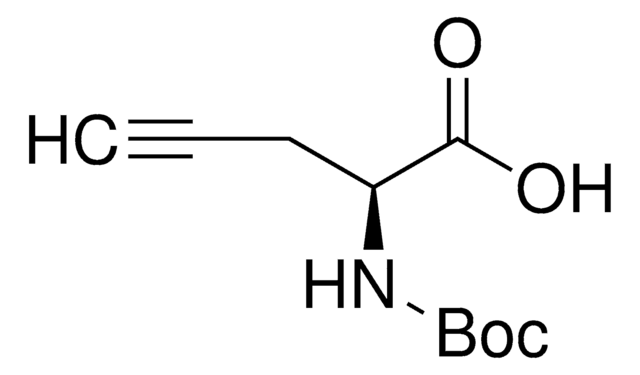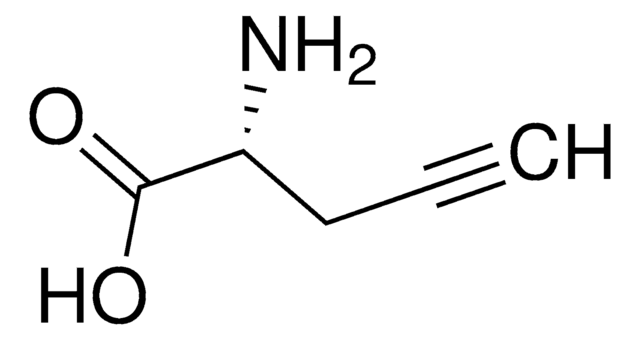81838
L-C-Propargylglycine
≥99.0% (TLC)
Synonym(s):
L-Propargylglycine, (S)-2-Amino-4-pentynoic acid
Sign Into View Organizational & Contract Pricing
All Photos(1)
About This Item
Empirical Formula (Hill Notation):
C5H7NO2
CAS Number:
Molecular Weight:
113.11
Beilstein:
2347861
MDL number:
UNSPSC Code:
12352209
eCl@ss:
32160406
PubChem Substance ID:
NACRES:
NA.26
Recommended Products
Product Name
L-C-Propargylglycine, ≥99.0% (TLC)
Quality Level
Assay
≥99.0% (TLC)
form
powder
color
white
mp
235-239 °C
application(s)
peptide synthesis
storage temp.
2-8°C
SMILES string
N[C@@H](CC#C)C(O)=O
InChI
1S/C5H7NO2/c1-2-3-4(6)5(7)8/h1,4H,3,6H2,(H,7,8)/t4-/m0/s1
InChI key
DGYHPLMPMRKMPD-BYPYZUCNSA-N
Application
Reagent for the irreversible inactivation of γ-cystathionase; affinity labeling reagent for γ-cystathionase and other enzymes; peptides containing this amino acid can be tritiated to high specific radioactivity
Biochem/physiol Actions
L-C-Propargylglycine, a specific inhibitor of H(2)S synthase of cystathionine-γ-lyase (CSE), may be used to study the role of H2S in regulation of biological processes.
L-propargylglycine (PAG), an inhibitor of cystathionine γ-lyase (CSE), is useful in studies of hydrogen sulphide synthesis and bioactivity.
Storage Class Code
11 - Combustible Solids
WGK
WGK 3
Flash Point(F)
Not applicable
Flash Point(C)
Not applicable
Personal Protective Equipment
dust mask type N95 (US), Eyeshields, Gloves
Choose from one of the most recent versions:
Already Own This Product?
Find documentation for the products that you have recently purchased in the Document Library.
Bridget Fox et al.
Journal of cellular and molecular medicine, 16(4), 896-910 (2011-06-18)
Hydrogen sulfide (H(2)S) has recently been proposed as an endogenous mediator of inflammation and is present in human synovial fluid. This study determined whether primary human articular chondrocytes (HACs) and mesenchymal progenitor cells (MPCs) could synthesize H(2)S in response to
Yan Gao et al.
International journal of cardiology, 152(2), 177-183 (2011-02-15)
Hydrogen sulfide (H(2)S) displays anti-inflammatory and cytoprotective activities to attenuate myocardial ischemia-reperfusion (MIR)-induced injury, but its role in MIR in diabetics is not known. This study was undertaken to investigate whether H(2)S plays a protective role in MIR in diabetic
Emanuela Pupo et al.
Free radical biology & medicine, 51(9), 1765-1773 (2011-08-31)
Hydrogen sulfide (H(2)S) is a gasotransmitter that plays several roles in various tissues, including the cardiovascular system. Because it has been recently proposed to act as a mediator of angiogenesis progression, here we investigate the effects of H(2)S in a
Ya Fatou Njie-Mbye et al.
Experimental eye research, 98, 16-22 (2012-03-27)
Hydrogen sulfide (H(2)S), a colorless gas with the pungent odor of rotten eggs has been reported to produce pharmacological actions in ocular and non-ocular tissues. We have evidence that H(2)S, using sodium hydrosulfide (NaHS) and sodium sulfide (Na(2)S) as donors
V Gil et al.
British journal of pharmacology, 164(2b), 485-498 (2011-04-14)
The role of hydrogen sulphide (H₂S) as a putative endogenous signalling molecule in the gastrointestinal tract has not yet been established. We investigated the effect of D,L-propargylglycine (PAG), an inhibitor of cystathionine γ-lyase (CSE), amino-oxyacetic acid (AOAA) and hydroxylamine (HA)
Our team of scientists has experience in all areas of research including Life Science, Material Science, Chemical Synthesis, Chromatography, Analytical and many others.
Contact Technical Service








